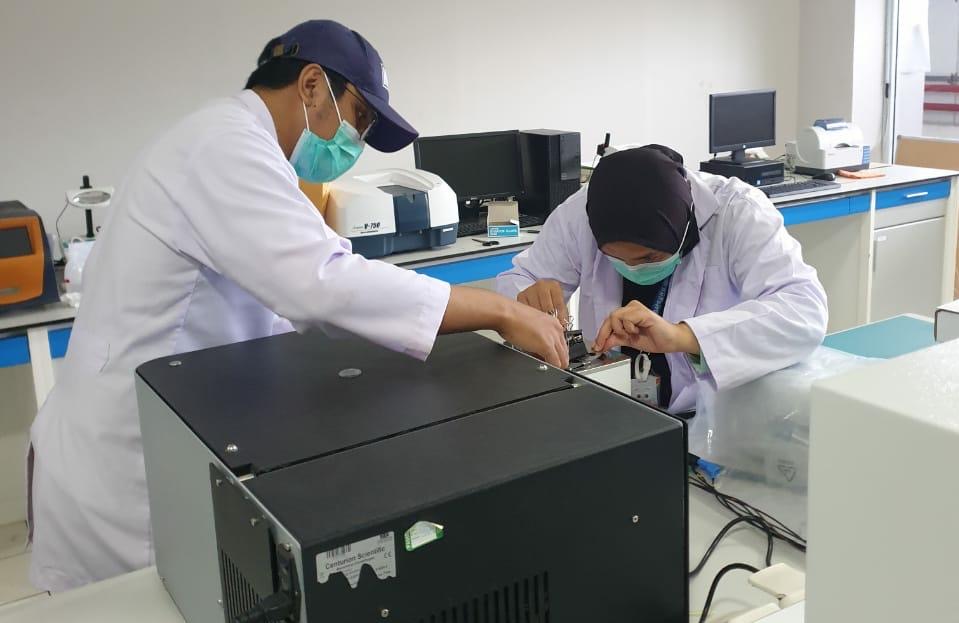 Illustration: Electrochemical Testing Practicum at Pertamina University Instrumentation Laboratory, 2020.
Illustration: Electrochemical Testing Practicum at Pertamina University Instrumentation Laboratory, 2020.
Pertamina University Cooperates with Petronas to Develop Sodium and Aluminum-Based Electric Car Battery
March 3, 2022 - The trend of electric vehicle use in Indonesia increases every year. The Ministry of Transportation (Kemenhub) noted that until November 2021, the number of electric vehicles in Indonesia reached 14,400 units. The Ministry of Energy and Mineral Resources (ESDM) in the Grand National Energy Strategy targets the number of electric cars will reach 2 million units and electric motorcycles around 13 million units by 2030.
The National Research and Innovation Agency (BRIN), said the main component used for electric vehicles is a lithium-ion battery. This type of battery is claimed to be superior in terms of service life and a faster charging process. But lithium-ion batteries cost more. For electric cars, about 40 to 50 percent of the cost is spent on lithium-ion batteries.These batteries require cobalt raw materials which are expensive and difficult to obtain.
From May to November 2021, The Mineral Intelligence benchmark noted that the price of lithium-ion batteries has doubled. At the beginning of 2022, the increase reached 240 percent, the highest level for the last five years.
Led by Sylvia Ayu Pradanawati, Ph.D., the research team of the Mechanical Engineering Study Program at Pertamina University offers a solution to utilize sodium and aluminum as the main raw materials for the manufacture of lithium replacement batteries.
“Over the past year, the team has been developing batteries by replacing liquid electrolytes into electrolyte polymers made from sodium and aluminum. In addition to obtaining alternative raw materials for batteries, the electrolyte made has also proven to be more resistant to high temperatures, compared to lithium. The price is also more economical,” Sylvia said in a virtual interview on Wednesday (02/03).
According to Sylvia and the team, the amount of sodium and aluminum in nature is much higher than nickel, which is the raw material for lithium. Thus, its availability will be more sustainable. Sylvia and the team's innovation is ideal for long-term goals. The price is also more economical. Bala Pachayappa, CEO of Sodion Energy, said sodium-ion batteries are 30 to 40 percent cheaper than lithium-ion batteries.
The process of making the battery electrolyte is quite simple. The sodium and aluminum salts are dissolved in a solvent and then mixed with the polymer. “The polymer used by the team is a natural polymer from nature. It is non-toxic and has a group of lone pairs of electrons that can be used as a polymer electrolyte with a fairly good ionic conductivity value. This polymer is also one of the natural materials that are not used optimally,” Sylvia said.
To complement the polymer, the research team also added fly ash produced from burning waste from the Steam Power Plant (PLTU). “This fly ash functions as a filler that can increase the conductivity of the polymer. The use of this cheap waste and salt is expected to reduce the cost of making batteries and expand battery applications," said the alumni of the doctoral program from the National Taiwan University of Science and Technology.
In future applications, apart from being potentially used in electric vehicles, these sodium and aluminum ion batteries can also be used for portable electronic devices.
This research also collaborates with Universiti Teknologi Petronas (UTP) owned by Malaysian oil and gas company, Petronas. Both campuses have the same goal of building an industry-oriented university. This concept aims to answer industry needs by developing superior human resources who are flexible and adaptive to the development of the industrial world, especially the energy industry, which is the specialty of the two campuses.
For students who are interested in the development of future energy, they can join the Mechanical Engineering Study Program at Pertamina University. Currently, the campus created by PT Pertamina (Persero) is re-opening registration for Online Entrance Exams and Selection of Report Values (without tests) for the 2022/2023 Academic Year. Further information on study programs and registration terms and conditions can be accessed through https://universitaspertamina.ac.id/registration.**